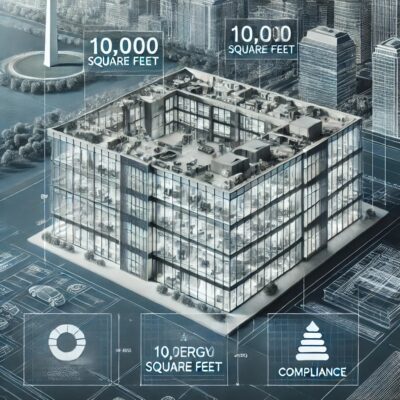The District of Columbia enforces some of the nation’s most stringent benchmarking rules. Starting in 2026, these requirements will extend to nearly every building with a gross floor area of 10,000 square feet or more. Please note this was originally planned to start in 2025, but was delayed by one year in December 2024 by City Council. If you own or manage a building between 10,000 and 25,000 square feet, navigating the new benchmarking requirements may seem confounding. Given that these properties will have to benchmark for the first time in 2026, this article will help you prepare for the process. Below, we break down the fundamentals, deadlines, potential penalties, and compliance pathways so you can confidently achieve compliance.
Understanding Benchmarking and BEPS
Benchmarking is the foundation of energy performance tracking in DC, requiring building owners to annually report energy and water consumption using the EPA’s ENERGY STAR Portfolio Manager (ESPM). This data is then used to calculate each building’s energy efficiency score. This score will then be used by a separate but related program, the Building Energy Performance Standards, or BEPS.
The BEPS Program sets minimum energy performance thresholds based on benchmarking data. Buildings that do not meet their specific standard must follow a compliance pathway, such as making operational improvements or conducting a deep energy retrofit, to reduce energy usage within a 5 year compliance cycle. Thankfully, buildings in this group will not be subject to BEPS until (at least) 2032, but that doesn’t mean you should ignore it! Making building improvements now can help you become exempt from the cycle altogether and save you money in your operations budget along the way.
Key Compliance Deadlines
- Benchmarking Deadline: Each building must submit its annual energy data by May 1, 2026. Failure to submit can lead to penalties and may impact your BEPS compliance status.
- BEPS Compliance Cycle: The BEPS compliance cycle begins on January 1, 2032, and extends until December 31, 2037. Buildings that don’t meet the minimum standard by 2037 must demonstrate compliance with their chosen pathway by this deadline.
Penalties for Non-Compliance
Failure to comply with benchmarking requirements can result in financial penalties. The District Department of Energy and Environment (DOEE) may impose fines of $100/day for properties that are not in compliance.
Getting Started with Benchmarking
For building owners and managers, early action is key. Here are practical steps to get started:
- Create an ESPM Account: Register with the EPA’s ENERGY STAR Portfolio Manager
- Report Building Characteristics: Gather information on space types, gross floor area, building amenities, and building use profile
- Upload Data: Upload meter information for every utility (electric, gas, fuel oil, water, etc) in your building and connect meters to the Energy Usage Data System (EUDS) and the Utili platform.
- Engage a Data Verifier: To comply with DC requirements, a qualified third-party verifier must review your benchmarking data every three years. This step is crucial to ensure compliance accuracy. Additionally, the gross floor area of your property must be verified by a credentialed professional
- Monitor Updates from DOEE and the EPA: Staying on top of benchmarking requirements is critical in ensuring compliance. The EPA is often updating the assumptions used in ESPM and failing to keep up to date could result in your account being flagged. Additionally, DOEE is consistently updating how it regulates the BEPS program and offering alternative pathways for compliance.
What To Do If You Don’t Want to Deal with any of this Crap
That’s easy, call us! Honeydew Energy Advisors provides annual reporting services to hundreds of properties in DC. We know ESPM like the back of our hands and have a great relationship with DOEE. One of our clients was facing $50,000 in penalties when they came to us. Within days, we had their benchmarking account squeaky clean, and DOEE agreed to reduce their penalty by 90%! Hence, it’s never too late to engage us.
Benefits of Working with Honeydew
- Unrivaled experience with DC regulations and Energy Star Portfolio Manager
- A friendly team that painstakingly reviews its work for accuracy and clarity
- Complimentary briefings with stakeholders like owners and condominium boards
- Ongoing consultation and RFP administration

